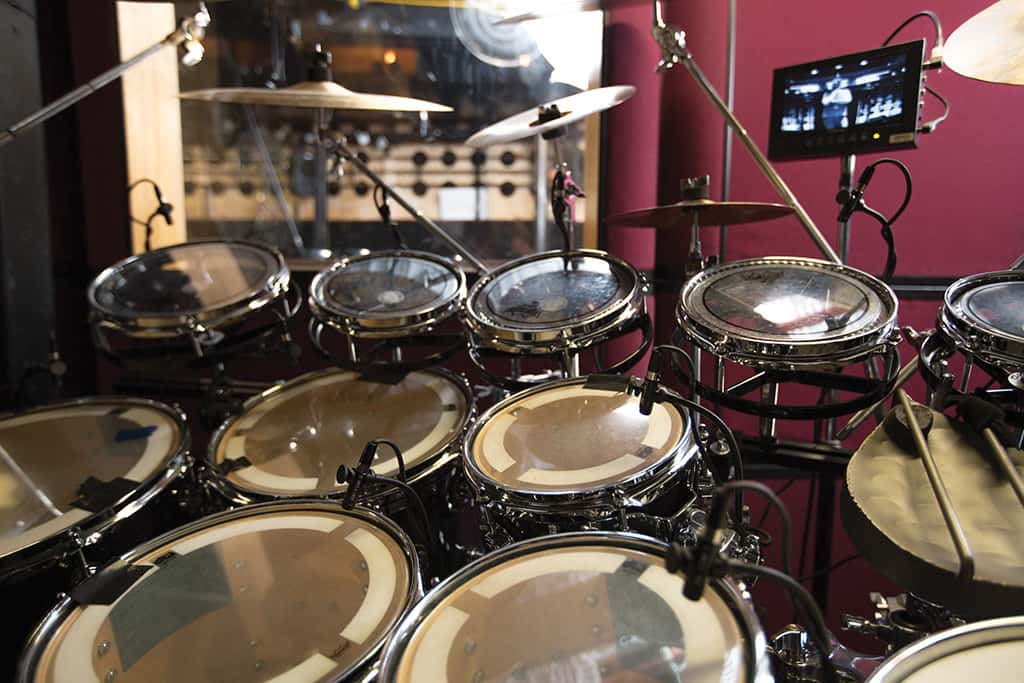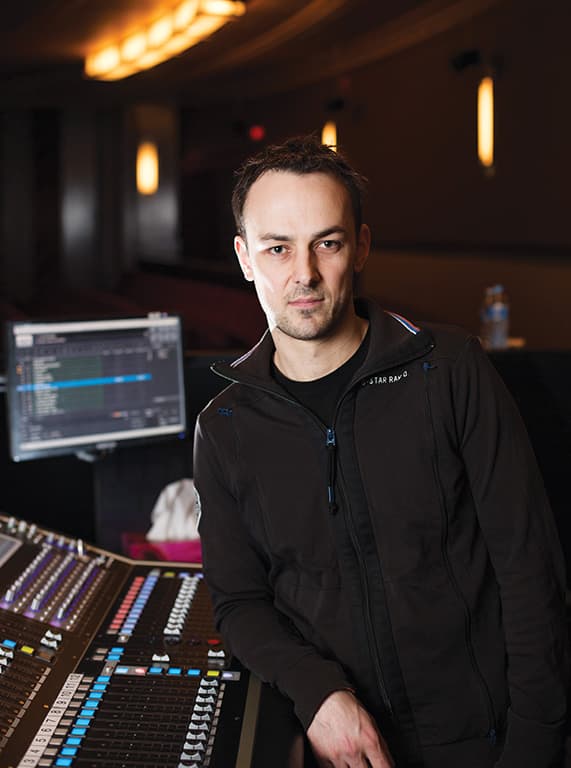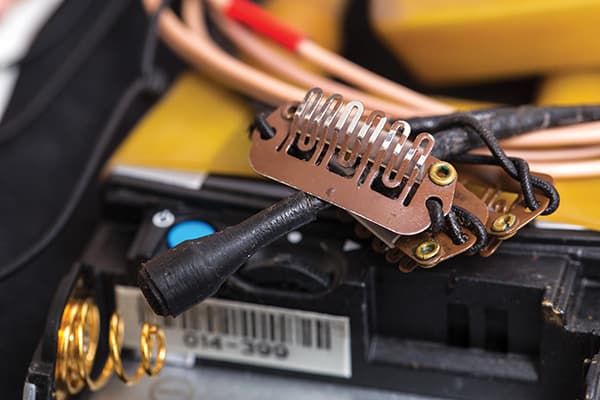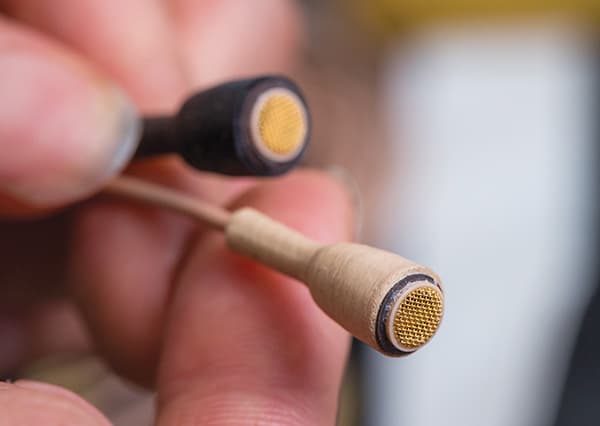
The Toughest Gig In The World
Three hours of non-stop fader throwing, eight performances a week and audiences hanging on every word. Is Les Miserables the toughest live gig in town?
Main Photo: Matt Murphy
Photos: James Brereton
Mixing top-draw musical theatre requires meticulous preparation and an OCD attention to performance detail. You may have as many as 40 omnidirectional miniature mics open on stage at once. What’s more you will have dozens of mics open in the orchestra pit. There’s a lot that could go crazy-wrong.
I caught up with Les Mis head of sound Al Lugger and associate sound designer, System Sound’s Shelly Lee. Al has been mixing the current Australian incarnation, while Les Mis is part of Shelly’s DNA having mixed the show for years in its previous Australian run.
I wanted to get a sense of the ‘day-in-the-life’ demands of mixing musical theatre. I discovered that the mix engineer not only needs to fastidiously, without fail, ensure every word uttered on stage is conveyed to a knowledgeable audience; but more than that, he or she needs to ride the tumultuous emotion of the performance. It’s not unlike requiring a micro-surgeon to recite tear-jerking poetry while re-attaching someone’s finger.
The intensity is only matched by the regularity. There are eight performances a week. Al tag teams with Evan Drill on mixing duties. Both engineers attend every performance as there’s plenty to be done other than having your mixing fingers ready come curtain rise.
Having two mix engineers may be essential to avoid burnout (as well as having some built-in dual-human-redundancy) but the need for consistency reigns supreme and it makes it difficult to guarantee a daily near-as-dammit-to-a-benchmark performance, month in, month out; year in, year out.
Shelly Lee: As we prepared for this run, I said to Al, if you can mix Les Mis, you can mix anything. Not because it’s necessarily the most complex show (although it has its moments) but because it’s so intense — three hours of 100% mental dedication. So apart from the demands of the technical preparations, the show itself is very draining.
Al Lugger: The orchestra never stops: there’s virtually no dialogue, it’s all sung. So if you switch off during Les Mis everyone in the audience hears that. And that’s the tough part about the show: maintaining consistency. If you vague out for five minutes, or if you miss a cue then it’s very difficult to catch up.
Shelly Lee: Most shows afford you the chance to have a moment of repose after a number. Press ‘stop’, wait for the applause to die down, cue up the next scene and switch on again. That doesn’t happen on Les Mis. It’s constant. Even when people are applauding there’s something going on underneath — there’s not that opportunity to take just a two-second breather and go, “Okay, where am I?”
Al Lugger: For example, the end of Act One is very tricky. There’s eight to 10 minutes of constant fader throwing, constant orchestra moves and you’ve really got to be on your game.
MINDING P’S & CUES
AT: How many cues are there?
Al Lugger: Around 120. We’ve got a QLab show control system which fires the Digico SD7 console.
Shelly Lee: Getting out of one scene and into the next is tricky. You’re often transitioning from one mood into another very different mood, so you’re required to seamlessly crossfade out of something that might be hard and loud into something small and delicate. Trying to get that absolute balance as you work through those scene changes to effect those mood changes… well, it requires constant focus.
AT: How long does it take to feel like you’re ‘all over’ the mix?
Al Lugger: We did two weeks of technical rehearsals and then 10 previews and I didn’t feel confident until probably the fifteenth show. So even through Press Night I was still very edgy and you’re really holding on for dear life because you don’t want to drop a line — people have paid good money and there’s a technical team around you that are expecting great things, so you really do try and keep your head down, to really live and breathe Les Mis.
Shelly Lee: You simply can’t drop lines; the faders have got to be up, you’ve gotta be in the right cue. All those things have got to happen. But more than that, you’ve gotta feel it. You’ve got to ride the ebbs and flows of emotion coming from stage.
In my experience there was a three-month period after which the show becomes part of your DNA and from there you discover and explore more of the emotion.
AT: What are some of the biggest dangers to a mix blowing up?
Al Lugger: There’s one big production number where 20 ensemble guys are on stage doing a ‘woo-hoo’ drinking-buddy song — Master of the House it’s called, for those who know the show. Every show is different and you never know when someone is going to sing straight at someone else’s head.
As you can imagine, if you bellow into someone else’s lavalier mic that will pop out of the mix. So we rely on a good communication with our directorial team and they’ll provide direction at rehearsals, “Hey guys, you maintain consistency here.”
AT: Have directors’ attitudes to audio changed much as these stage shows get bigger and more ambitious?
Al Lugger: Audio has traditionally not been high priority in the lead up to a show but it’s the first thing they’ll comment on come opening night.
Shelly Lee: Sound isn’t tangible. People find it very hard to get their head around it, including us at times. It is not uncommon to have unexpected parameters enter into the equation because of the nature of the environment and all the variables that exist. Also translating the interpretation of the director’s vision into something technical is a challenge unto itself. Taking on sound engineering as a career is not for the faint hearted and will be constantly challenging as it is rewarding.
You simply can’t drop lines; the faders have got to be up, you’ve gotta be in the right cue. But more than that, you’ve gotta feel it























Cool article. Lots of Sennheiser beltpacks there. How many channels? Be interesting to hear how they are managing frequency planning in a post-digital-dividend world…
Guys the sound is amazing and you have done a great job with LM, but please you need to bring the rain effect back to “On My Own” she sings about the rain makes the pavements shine like silver, you really need the rain back please please. The song is better with rain sounds..
Beautiful work guys! I runned the FOH for LM before and I couldn’t agree more about the intensity…And I want to extend the thought about feeling the show to all the shows! When I feel comfortable with the Mix is when I can feel every single scene…